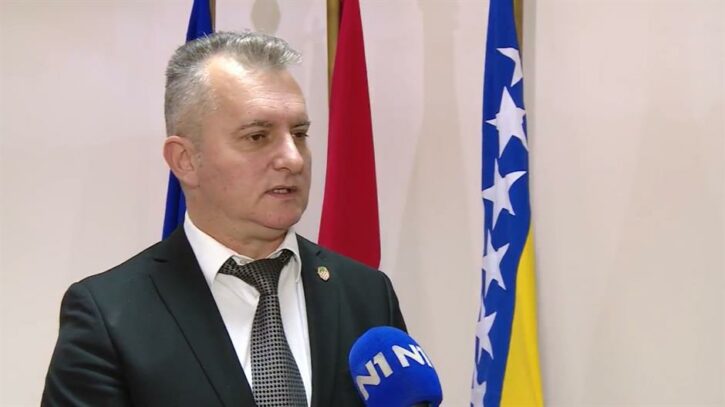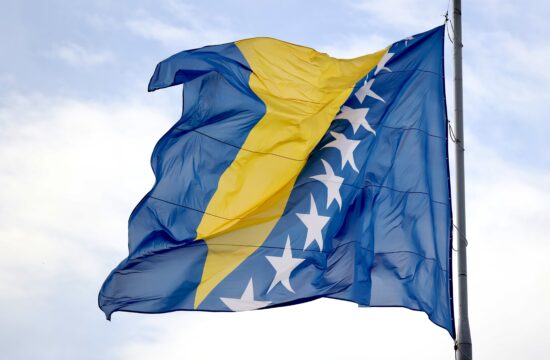
Bosnian Croat political parties are discussing the re-creation of the separate Croat republic they had during Bosnia’s 1992-95 war and will not give up the project, the head of the Bosnian Croat caucus in the House of Peoples, Mario Karamatic, told N1 on Monday.
“This needs to be prepared seriously, and we are working on it,” he said, adding that the Bosnian Croat parties will be persistent enough to overcome the international and local resistance to the project.
“They will get tired, we will not,” he said.
The 1992-1995 war left Bosnia and Herzegovina divided into two semi-autonomous entities, the Bosnian Serb-dominated Republika (RS) Srpska and the Federation (FBiH) of Bosniaks and Croats.
Since the signing of the 1995 peace agreement, however, hardline Bosnian Croat officials have been seeking to have their own entity like the one the Serbs have. Some have been advocating for the recreation of the wartime Republic of Herzeg-Bosnia (HB), the parastate they had during the war.
“We are not speaking about a third entity,” Karamatic said. “We had a republic,” he said, referring to HB.
Herzeg-Bosnia seized to exist with the signing of the Washington agreement in 1994, which ended the war between the Bosniaks and Bosnian Croats.
Because of the war crimes committed during the establishment of the pure Croat territory of HB, the UN war crimes tribunal in the International Criminal Tribunal for the Former Yugoslavia (ICTY) ruled that the project was a “joint criminal enterprise,” in which neighbouring Croatia has taken part with the goal of annexing the territory.
Karamatic said that the Bosnian Croats brought HB into the Federation and into Bosnia with wartime agreements, including the Dayton Peace Agreement.
But “if one side is cheated” in an agreement, he said, “it has the right to go back to square one,” implying the reestablishment of HB.
He has earlier said that Bosniaks had violated the spirit of the peace agreement by voting at past elections for the Croat member of the country’s three-member presidency, instead just for their own.
Bosnia’s presidency consists of three members, each from one of the three majority ethnic groups in the country, Bosniaks, Croats and Serbs.
Bosnian Croat and Croatian officials have been saying that, in the October general election, the Croat representative in the country’s tripartite presidency was elected thanks to the votes of the numerically dominant Bosniaks. That violated the spirit of the Dayton Peace Agreement, which ended the 1992-1995 war in the country, they said.
Effectively, this is how left-leaning Zeljko Komsic took the Bosnian Croat seat in the Presidency from Croat nationalist hardliner Dragan Covic who received most of the Croat votes.
Karamatic said that the Croatian National Assembly (HNS), a group gathering Croat ethnic-oriented political parties, had “talked about the initiative,” of re-creating Herzeg-Bosnia but that nothing was initiated because the HNS wants to do it right.
Croats are endangered in Bosnia, Karamatic believes, saying it is good that Croatia has adopted a Declaration on the status of Croats in Bosnia.
The Croatian parliament’s Friday Declaration calls for amending Bosnia’s Constitution and election legislation with the aim of enabling the Croats, the least numerous constituent people, to be equal to the other two peoples in that country and be able to elect their own representatives.
It was, however, met with criticism in Bosnia.
A group of intellectuals gathered in Sarajevo and announced they would put together an ‘anti-declaration’.
The harshest criticism, however, came from the main Bosniak ethnic-oriented political party in the country, the Party for Democratic Union (SDA). They said that Croatia’s behaviour represents a “grave attempt to damage the sovereignty of Bosnia and Herzegovina.”
“That document is not binding,” Karamatic said but added that it is important that the Croatian public has been informed about the status of Croats in Bosnia.
“The (Croatian) Parliament and Government stand behind Bosnian Croats, and this is the first time they do since the end of the war. Up until now, it was some kind of ‘ostrich politics’, they buried their head into the sand. Now they took it out and opened their eyes,” he said.




